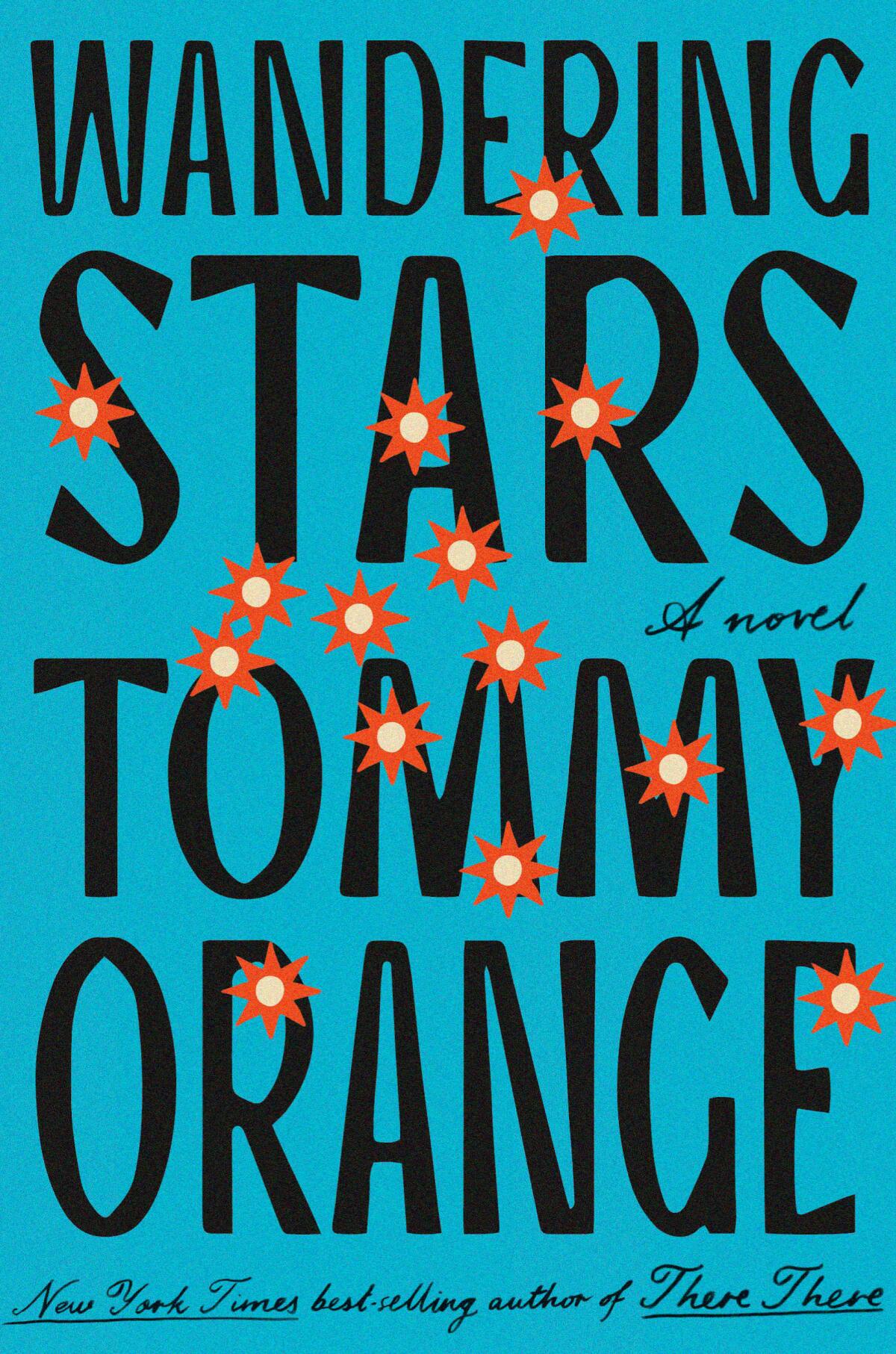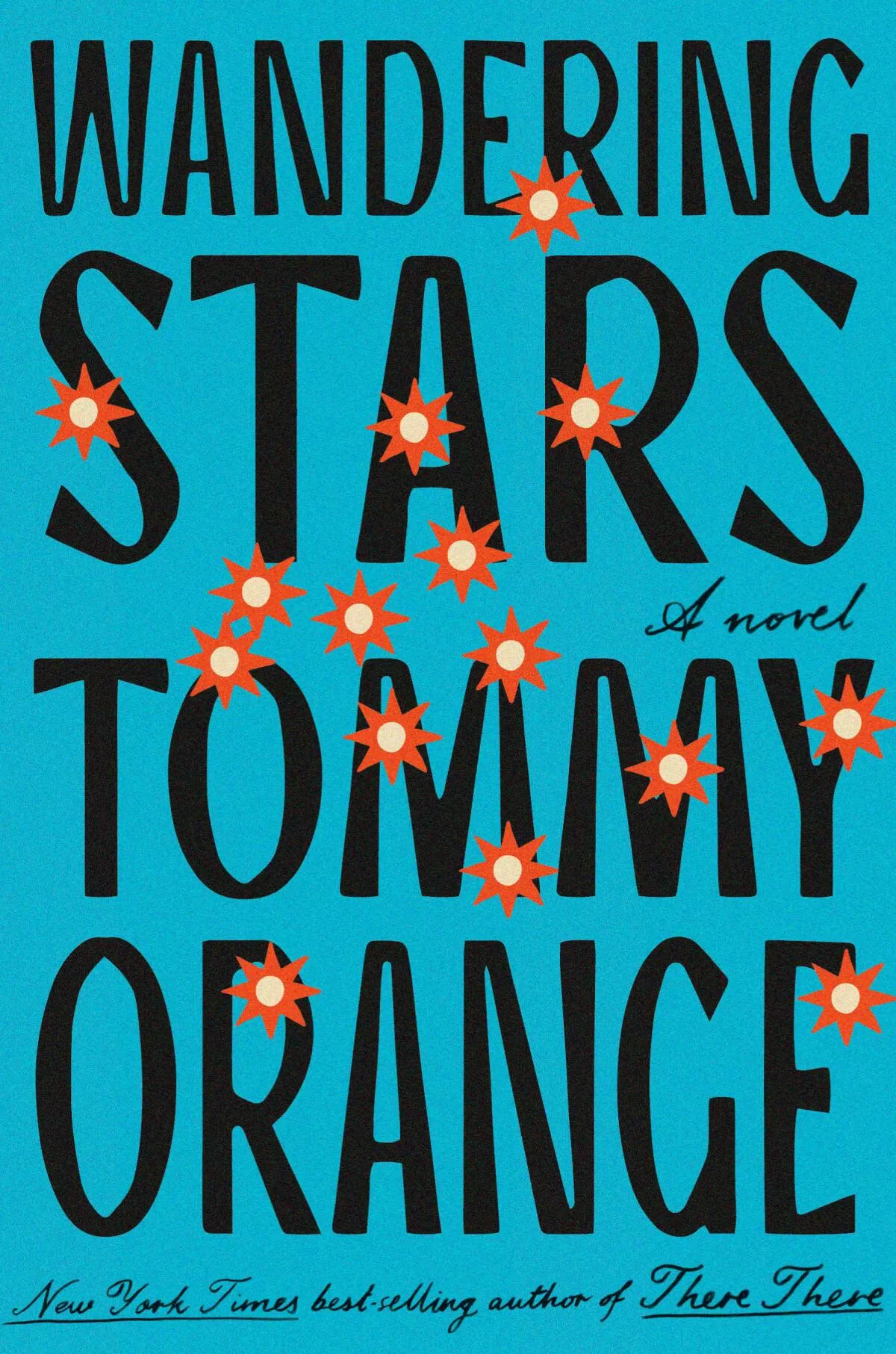On the Shelf
Wandering Stars
By Tommy Orange
Knopf Publishing Group: 336 pages, $29
If you buy books linked on our site, The Times may earn a commission from Bookshop.org, whose fees support independent bookstores.
For Tommy Orange, there was before “There There,” and there was after. Before: He was a struggling writer, teaching in an MFA program. After, the dream: bestselling author, Pulitzer Prize finalist, his book on syllabuses across the country, invited to speak at literary events worldwide. It was a rare and lasting achievement.
His new book, “Wandering Stars,” is also a before and after. This much-anticipated novel serves as both a prequel and a sequel to the first. That unusual choice means it can be read without the centerpiece of 2018’s “There There,” which ended with Orvil, one of the main characters, in peril at a contemporary powwow in Oakland. But if you have read “There There,” it’s an unexpected, multifaceted expansion of that story.
Orange had finished writing “There There” with no intentions of a follow-up when, close to its publication, he heard “Wandering Star” by the band Portishead. “I knew the song already, but something about wandering stars at that moment,” he said over Zoom in January, “I was like, ‘Oh, I want to do a sequel.’
“It had to do with being interested in how Orvil would experience the aftermath of what happened.”
A sequel would give Orange “a way to also talk about historical trauma … tracing through history and feeling the reverberations of something that happened a long time ago,” he added.
To get there, Orange first goes way back, to two boys fleeing the 1864 Sand Creek massacre. The scenes of violence, deprivation and survival in “Wandering Stars” are reminiscent of Cormac McCarthy’s western frontier novels — only told by Indians, not cowboys. The book comes amid an increased focus on Indigenous representation in media, alongside the FX series “Reservation Dogs” and Martin Scorsese’s Oscar contender “Killers of the Flower Moon” (Lily Gladstone recently became the first Native American to be nominated for the lead actress Oscar for her role in the film).

“It’s an amazing moment,” said Orange, who is an enrolled member of the Cheyenne and Arapaho Tribes of Oklahoma. Aware that Native American stories have emerged and ebbed from the culture before, he’s cautiously optimistic: “I’m hoping this time around we have enough energy to build some kind of sustainable infrastructure that will keep interest in us.”
In the chronological chapters of “Wandering Stars,” Jude Star and Bear Shield’s stories move from one generation to the next and the next, reaching all the way to Orvil and his 21st-century Cheyenne family.
He’s a smart teen in a good school, but he’s on uneasy footing. Some of his friends are screw-ups. He’s more focused on music and video games than schoolwork. And he’s got a prescription for drugs that takes him to a rapturous place, “feeling like the milk of gold was buzzing in his eyes and filling him up.”
When Orvil is high, the prose is often full of pleasure. “I was trying to write something that felt true to what it’s like to experience these different states and what some of the draws are,” Orange said. The subjectivity of experience is something a novel can do that is rarely captured onscreen, and Orange does it, whether he’s bending time or showing what it’s like to float, for a time.
In some ways, the intoxication is an antidote to the torture and loss portrayed in the earlier parts of the book. But it is not disconnected from it; it’s both an aftereffect and a symptom.
Going back to the era of the Indian Wars had not originally been in Orange’s plans. In fact, characters in his books rail against the cliched depictions of Native Americans in vintage settings. “I was against it,” he said. “I really wanted to write only contemporary stuff.” But a series of coincidences changed his mind.
During a chaotic trip to Europe — he’d missed his departure when his backpack was stolen — his Swedish hosts urged him to take a museum tour of their Native American collection. There was acknowledgment that it’s problematic for Native American regalia to be stored away in Sweden, but they thought he’d like to see it.
“It’s a cool little exhibit,” Orange said. “I see this newspaper clipping and it’s Southern Cheyennes in St. Augustine, Fla., in 1875. I know enough about my tribe’s history to know that we were never in Florida.” Down the rabbit hole he went, learning about the Southern Cheyennes who’d been imprisoned there, forced to adopt white culture while abandoning their own.
“I realized St. Augustine was the blueprint for the Carlisle and boarding schools across the country that for decades were about ‘killing the Indian to save the man.’ My tribe being the centerpiece for this made me intensely interested because you don’t often hear about Southern Cheyenne history, specifically,” Orange said. “Doing this research was the moment that I decided I was going to do this historical piece.”
That wasn’t all. Among the prisoners’ names, Orange found a Bear Shield. “Reading that, I was overcome with emotion. I think I cried,” he said. The Bear Shield family is a major part of both “There There” and “Wandering Stars.” “There was the name Star also. And I’d already started writing a character named Star without having known this.” And he’d already had the book’s title; the pieces fit so well, it was as if they’d been laid out there for him.
Part of that, perhaps, is the way he approaches the writing itself, both work and something more ephemeral. “It really feels like a collaboration with a part of you that you don’t necessarily have access to,” he said.
“Writing is kind of a mysterious process. You’re tapping your fingers at letters on a keyboard and all of a sudden, you have an idea that you couldn’t have thought of before. Writing is a form of thinking, but it’s a form of thinking you don’t have access to unless you’re writing.”
While working on “Wandering Stars,” Orange occasionally booked himself into a hotel to focus on writing. Like the esteemed writing retreats Yaddo and MacDowell — both of which he’s been to — it’s a way to have quiet time to type, but right in Oakland. “It’s my favorite place to do it,” he says. And it’s a time to get to access that tricky, elusive part of writing.
“I think writers, you know, want to take credit for everything,” Orange said. “But I feel it’s more mysterious than that.”
Kellogg is a former books editor of the L.A. Times.
